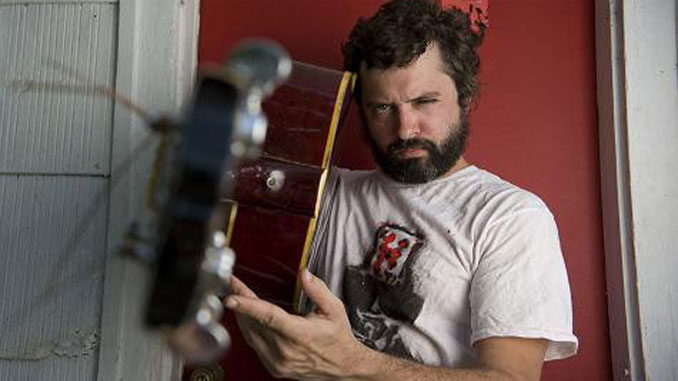
The interviewer has to admit that Sonic Youth should be credited for being behind this interview. Sort of. Strange but true. The reason to this is that the first time I found out about John Wesley Coleman was when I read Thurston Moore’s and Byron Coley’s appreciative description of The Golden Boys’ second album Whiskey Flower (2007) on the sticker attached to its front cover:
A very cracked and shakey take on raunch-hootenanyism recalling members of the In The Red stables, as well of Memphis’ more lop-sided degenerates. There are parts of this disc that cohere into something identifiably musical, but not enough to bother us. (Arthur Magazine)
Whiskey Flower was further described as “Alex Chilton listening to Buck Owens before he did Like Flies on Sherbert”. In addition, since Whiskey Flower was released on Hook Or Crook Records, there were no further excuses for not following up on where this band was heading.
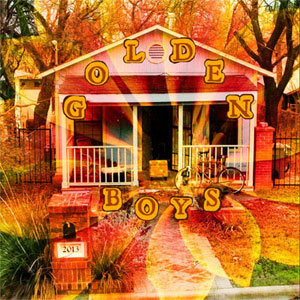
In that way, John Wesley Coleman’s versatility resembles that of a Renaissance person; one with acquired skills in many areas. Likewise, it may also be justified to call him a “maverick” as he seems to be an unorthodox and independent-minded person.
In John Wesley Coleman’s case, this blend of versatility and nonconformity is combined with a personal high energy level (for a slacker), which results in an exciting one-man creative laboratory that holds an unusual dynamic and imaginative grit. This bubbling creativity is reflected in his musical productivity, he’s got twelve solo albums out since 2005 and another six as a member of The Golden Boys. Plus a wealth of singles and EPs, of which some are splits with other artists. These records have been released by a number of different labels that are genuinely dedicated to good music, such as Windian, Goner, Alien Snatch! and Daggerman.
Now, after this brief introduction, when everyone has got at least overall basic prior knowledge about our interviewee, let’s move on to the conversation itself. It resembles a sightseeing tour with far too few stops. Hopefully, our talk will anyhow paint a sufficiently full-fledged picture of the achievements, working conditions and the crucially important personal network of a struggling and indefatigable artist. Here we go:
PopDiggers: It cannot have escaped anyone who knows what you are up to that you seem to be doing many different things at the same time. What’s the background to it?
John Wesley Coleman: Well, I guess it is all because I like to write. I like ideas, developing characters and story telling in general. My brain is constantly on. I can’t turn it off. If I can’t draw, I’ll make music and if I can’t make music, I’ll draw. I do a lot of drawings. When I was a kid, I wanted to be a cartoonist. And music has always been there along with the writing.
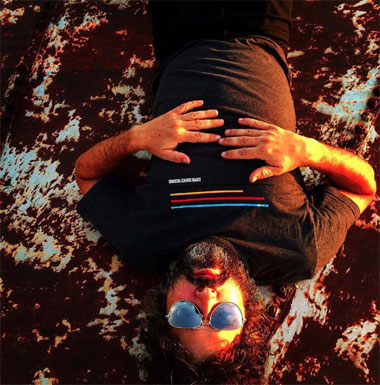
When I was playing piano around the house, I made my own songs right from the start without learning the basics of piano playing. Like, this is a song for my mom, and this is a song for my dog. I just made them up.
Later I got into rock’n’roll and the skateboard culture, eventually really learning classic rock’n’roll from listening on the radio. I used to borrow guitars from the neighbors. On my street, I would go down to the neighbors who had a guitar and they showed me how to play a Rolling Stones’ or a Jimi Hendrix’s song. And I was sitting on the curb outside our house banging away on these borrowed guitars for hours and hours every day. Eventually, my father thought I needed a guitar, so he bought me one when I was twelve or thirteen.
Then I got into Velvet Underground and Lou Reed. I found a tape that I played over and over trying to copy their guitar sound. I was getting guitar lessons at that time. But I didn’t take very many lessons, because I just sat there and talked to the teacher about Velvet Underground, eating candy and playing the Sweet Jane riff over and over again. What I’m trying to say is that I’m more or less self-taught.
PD: Did you have any other influences besides The Velvet Underground then?
JWC: Well, early on Jimi Hendrix and The Doors. My mom bought me records and I borrowed records from my neighbors, like Rolling Stones and Pink Floyd. Also MTV, they used to play music videos during that time. I really liked Michael Jackson and tried to learn how to dance like him and did performances in front of my family and relatives. They came over and watched me when I put music on and danced like crazy, jumped around and broke stuff. And they gave me money. Here’s five dollars, you know. I destroyed my room in the process.
I watched these skateboarding videos and they had a soundtrack, like hard core skate punk. So I found out who those were. When I skated on ramps, I brought along a portable radio boom-box. In Dallas they had independent radio and they played bands like Minutemen and stuff. I made mixed cassette tapes from those radio transmissions. And then I got into punk rock in the early eighties. I kind of went from there. At the same time, I listened to Elvis Presley and The Beatles. Fell in love with all that too. When I heard The Beach Boys in early college, I got really into Pet Sounds and all their other records.
Another big influence was when I found SST Records and saw their catalogue. I wanted every single record from that. There’s a lot of them and I like every one of them: Black Flag, Sonic Youth, Dinosaur Jr., Hüsker Dü, name it. It just blew me away.
Later on, in the nineties, I started to go to concerts and watched bands like Pavement, The Flaming Lips and a bunch of hard core punk bands. And then I tried to play that stuff. But it always sounded different. When I tried to play like a fast punk rock band, it sounded slow, sloppy and not very good. And when I tried to do garage music, it didn’t sound like that either.

JWC: I was living in North Texas at the time and moved to Austin. I tried to get people to know my music in order to get into the scene. I had a bunch of recordings recorded over a five-year period. Different things with different people and studios, experiments and stuff. I taught myself how to make four-track records. People gave me live recordings of my music. So I just picked like twenty something tracks, put them together myself, made some art to go along with it and paid for 100 CDs and started to circulate them. This label Monofonus saw that, and they wanted to release it and put money into it. Then they wanted to include some writings from me because they knew I was writing poetry and short stories. And then I found a Billy Childish book. He has so many art and poetry books. Then I thought that I had a lot as well. So I stayed busy, used to write on the bus around town. The label took my writings and put them together in a book with the music CD and released it.
American Trashcan got some attention. I was in the newspaper and did some readings at the college in front of a bunch of people and they paid me like $ 100 to read poetry and play music. I was pretty happy about that. Zines then asked me for poems. I don’t know if they are really good. I don’t even know if they are poetry, I just write things that make me laugh or that I find interesting. From them I take ideas to make songs of. Some of the ideas I have also used in stand-up comedy.
 American Trashcan showed early on that I could do a little bit of everything and led to that I managed to do cohesive records later on. Cash Flow was the first one. My friend took his money and put me in the studio. But there was a whole lot of partying at that time. I was in my mid-twenties and on drugs and alcohol.
American Trashcan showed early on that I could do a little bit of everything and led to that I managed to do cohesive records later on. Cash Flow was the first one. My friend took his money and put me in the studio. But there was a whole lot of partying at that time. I was in my mid-twenties and on drugs and alcohol.
PD: And then The Golden Boys?
JWC: Right. We were The Golden Boys for fifteen years. Those guys saw me grow up through my thirties and early forties. We did six LPs and a bunch of singles. We went to Europe and played and toured a lot in the US. When The Golden Boys were not so active, I stayed busy with my solo work. The Golden Boys were a five-piece band and four of us wrote songs, so I kind of wrote parts for harmonies and things that come in and out in the songs. A lot of times, I took a song that was slow and showed it to the band and they made it real fast. Or vice versa. They really knocked down on everything they didn’t like – it was: do this, try that. But when I do a song solo no one decides how it should sound besides myself.
All of us were too much. Grumpy dudes. When we got together it was always like a big mess. Like crazy. On tour, when we got into a club, and all kinds of shit happened. We’re not mean people, we’re really nice but we’re just beer drinking, rock’n’roll dudes who were all over the place and never tried to fit into a genre. Yeah, it was a fun band to be in. They were like my brothers.
But eventually they didn’t want to do it anymore, but I really wanted to keep going. We broke up eventually. We didn’t tell anyone that we broke up, we just stopped playing. A part reason to break up was that they got tired of playing with me. They got tired of me. Like, you’re just too much!
But I still have some contact with them. We talk, like group chats on the phone just to make each other laugh over some dumb shit. One of the guys even plays a little guitar on an album I am recording right now.
PD: I started to listen to The Golden Boys in 2007 thanks to a sticker on Whiskey Flower that was signed by Thurston Moore.
JWC: I saw him once at a record store performance in Austin. He wrote this review about us and I saw him. We had another record out and I gave it to him. Cool, he said, and put it in his bag. That was it. I didn’t talk to him. I don’t know if he ever listened to it.
PD: You have been involved with rather many different labels during your career?
JWC: Yeah, I’ve been lucky that way. I have a relationship with a lot of different labels. Part of the reason is that I do a lot of touring. Labels like to put out records if you stay busy on the road. I’d meet people in different cities who have labels. They see my play and if they liked it, they ask me. Whenever I’m on the road, I like to put a day or two at a studio somewhere and record. To see how I sound on that trip. It always changes. The vibe, the energy. I try to capture that on the records.
The people that put out my records are always somehow connected. This guy knows that guy – it’s like a chain. If I am in, like Detroit, some guy walks up and says “I love your records. I have a label and will put your record out”. Oh, yeah. “And when you get home, I’ll send you some music.”
I did pretty good one year and put out a handful of albums and a bunch of singles. But at the same time I got in trouble for drinking. Trouble with the law as well. That slowed me down a bit.
PD: It sounds like you’re living a hectic life.
JWC: I’m always pretty occupied with this and that. My face is now probably red for being in the sun. I’m doing a lot of landscaping. Right now I’m staining a wooden deck and am about to paint this house. A friend works with me. He’s a music producer; an engineer guy. He’s out of work, so I got him some.
In these covid times it’s good to have a close circle of friends that I can hang out with and make music. We made an acoustic garden concert a while ago. It was fun.
PD: Sometimes your music and lyrics remind of David Berman’s Silver Jews. Inventive and low-key surreal. You even made a cover of We Could Be Looking For The Same Thing.
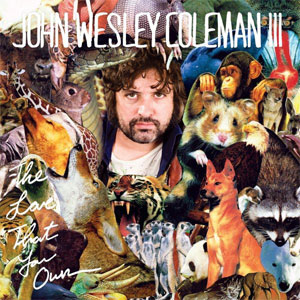 JWC: Yeah, years ago on the Burger Records’ LP The Love That You Own I did a cover of that. It’s the last song of the album. I recorded that album with Louie Lino. He’s an amazing guy. He plays keys in Nada Surf and has a studio here in Austin. I can’t remember exactly why I chose to cover that particular song. It was the last thing I did on the record in the studio. The studio had a bunch of whiskey, a whole big jug. I was pretty much done, since this was the last song. The idea was that I come back a few days later and lay down the proper vocals on the scratched original vocal track when I had sobered up. So I sang this song all drunk the first time, because I thought my vocals would be fixed afterwards. And then I left. I didn’t know, but the girl backup band put on backup vocals with my drunken vocals. When we listened to it, we said we will keep it, even though you can hear that I’m really drunk. Karaoke drunk. I figured that put energy into that originally serious song and made it uplifting.
JWC: Yeah, years ago on the Burger Records’ LP The Love That You Own I did a cover of that. It’s the last song of the album. I recorded that album with Louie Lino. He’s an amazing guy. He plays keys in Nada Surf and has a studio here in Austin. I can’t remember exactly why I chose to cover that particular song. It was the last thing I did on the record in the studio. The studio had a bunch of whiskey, a whole big jug. I was pretty much done, since this was the last song. The idea was that I come back a few days later and lay down the proper vocals on the scratched original vocal track when I had sobered up. So I sang this song all drunk the first time, because I thought my vocals would be fixed afterwards. And then I left. I didn’t know, but the girl backup band put on backup vocals with my drunken vocals. When we listened to it, we said we will keep it, even though you can hear that I’m really drunk. Karaoke drunk. I figured that put energy into that originally serious song and made it uplifting.
We never paid money for that song. I insisted to call the song Silver Jews, making it obvious to whoever sees the title will also recognize the song. I didn’t want to hide it. Then if anybody gets a hold on it and asks, that’s cool. Here’s the money. But the funny thing is that when I told that to Burger Records, someone printed it to be called Silver Jeans! They had no idea that it had anything to do with the band Silver Jews. It’s so weird.
When David Berman died, that song came back around and people started to talk about it. It upset me when he died, but everyone was just waiting for him to do something. He’s been in a mess for a long time. I saw him play. He was a great poet. I have also played this song live, in a rocking way with saxophone even though I seldom do covers on stage.
PD: A while ago, I saw an interview you did with Davy Jones from The Hickoids. How did that come about?
JWC: This is one of the many things I have to finish since many years. Walter Daniels, Big Foot Chester, is legendary and lives here. He’s a good friend of mine and he plays on some of my records. He has been in all these bands forever (PopDiggers’ comment: Jack O’Fire among others) and he is good friends with The Hickoids.
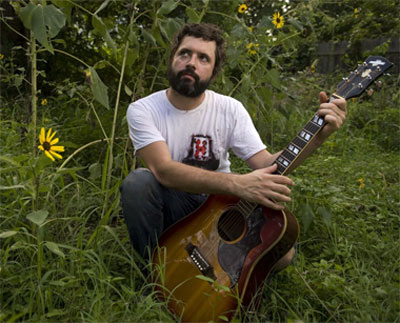
Walter and Davy Jones of The Hickoids were really good friends. Walter Daniels and John Schooley (PopDiggers’ comment: John Schooley of The Revelators among other bands) told me to go over to Davy’s house. Ask a few questions about his life because he might not be around much longer. So I went over to film him. But he was so sick with cancer and on his way out. Davy said: “This is not about me, it’s about Walter Daniels”. Davy had all those flyers of shows that he played with Walter, so we sat down and talked about Walter. And then we talked a little bit of Davy as well.
So when Davy Jones passed away, and since I had this footage, I thought that it would be nice to put what I had together and send it to his friends. And they put that out. So it’s a kind of an excerpt of a documentary of Walter Daniels. The film is going to be called “My Friend Walter”. I just got a new computer with editing software and I’m learning how to use it and will try to get this film finished this year. One of many projects.
There are a lot of people involved in this film. The cool thing about it is that it shows the Austin music scene that people don’t really know about. Rock’n’roll guys who have been around forever and the stories around them. It’s kind of fun, but I need to finish it.
PD: Talking about film, you starred in the re-make of Richard Linklater’s Slacker from 1991.
JWC: Yeah, but I have only seen it one time – at the premiere in 2011. I did a music video for a band and the girl in that band is a known filmmaker. We became friends. I was enrolled by accident. I was listening to one of my friends’ music and called him because of that. He said he was on this movie audition. “Your name came up. They want you to try out for this movie”. “Alright”, I said. “When?” “Right now.” I was really sick that day with the flu or something and felt awful. “I can’t leave the house.” “If you want to do this, you have to come over today.” So I went over there sick and acted on the camera and read from the script. It was between me and another person, but I got the role.
I had to learn seven minutes of dialogue. They shot it with real Kodak film with a big film crew. It was very expensive so there were no room to mess it up. This is serious. You got to know your lines.
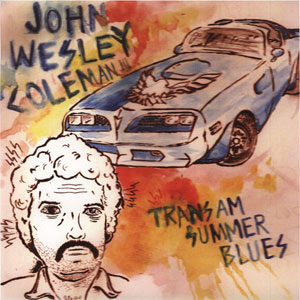 At the time I was working in a restaurant making pizza. I had cue cards that I brought to work every day. I read the lines over and over while I was making a pizza and learned them that way. And I looked at them in the car.
At the time I was working in a restaurant making pizza. I had cue cards that I brought to work every day. I read the lines over and over while I was making a pizza and learned them that way. And I looked at them in the car.
The very hot summer day when I was shooting it, I was also in the studio making a record. I decided to make a record that sounded like a classic summer rock ballad record. A silly record, sort of. Which is Trans-Am Summer Blues. Just a fun record. Nowadays it bugs me a little bit.
PD: I’ve heard that you are writing something on Jim Morrison?
JWC: Yeah, I’m editing the manuscript on my computer at the moment. I’m really close to being done. It’s almost like I don’t want to finish it. I’ve written on Jim Now for years. It’s not really that long. Like 80–100 pages. Novella type.
It’s a counterfactual story. He never died. He doesn’t play music any longer. He just lives in an apartment. Rides the bus. It starts out like Kafka style. He has a hard time just getting out of his apartment. He always falls down, passing out. But then he gets a phone call from this fast food chain restaurant that sells bacon products. He originally wanted to write a song for a fried chicken restaurant chain, but he gets this job because they wanted to use him as a celebrity to promote this franchise of bacon products. He’s in L.A. and goes to this meeting with these people to discuss the job.
I tried to write the dumbest things I could do to make myself laugh. I’ve listened to so much Doors and read about them during the writing of the book. The text lives its own life and changes constantly. At the very end of the novel, The Doors want him to do a concert on TV.
Since I have become a father, I have to revise some of the words because it’s so vulgar at places. I can’t let my kid read it as it is. But I’m pretty much done with it now after ten years. I will make a few changes, then I want to print it.
PD: Are there any moments and encounters that you want to share from your extensive touring?
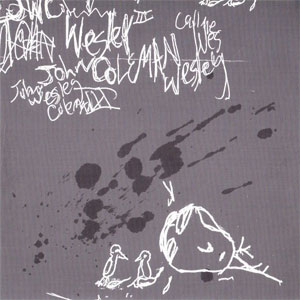
Then there’s this band I have to mention, Spider Bags, originally from New Jersey but they moved to Chapel Hill, North Carolina, where Merge Records is situated. They have a distinct New Jersey accent which they exaggerate when I start to talk as a Texan redneck. They are on Merge. Spider Bags backed me up and I made many records with them. They have covered one of my songs on their records. (PopDiggers’ comment: Summer of ’79 on their album Frozen Letter from 2014.)
Spider Bags have many records out. I have toured a lot with these guys. One time we were in Memphis, we played and were going to bed early because we had to be in Florida the next day. But Jack Oblivian just got back from Europe that night and he was at the show. Afterwards we went to his friends’ house to wind down but instead we stayed up till the sun came up. Jack is a great guy – a true rock’n’roll hero, just as the other two; Greg and Eric in The Oblivians. Jack and I have played a few shows together. OK, so we slept only for one or two hours. Then we got in the van and drove. It got dark early because it was winter and we drove in the dark with white knuckles clenched to the steering wheel. All the way to St. Petersburg in about 15 hours. It was insane. It was when we toured with the Steal My Mind album.
PD: What about the music scene in Austin right now?
JWC: I’ve been here since 2003. It has gotten harder for musicians because the rents have gone up so much. A lot of people want to live here and a lot of technology companies moved here. Austin is otherwise like an arts and music and school capital. Since a while it seems like that it just got more expensive to see or even play shows and getting there by taxi if you want to have a drink. And they cut down the noise ordinance because a lot of condos were built downtown. And new hotels. They’re like “We love live music – but we don’t want it very loud at certain times and places at night.” A lot of venues have issues with these new companies and the people moving in. It kind of have made upholding the scene a little bit of a struggle. There’s a lot of stuff going on.
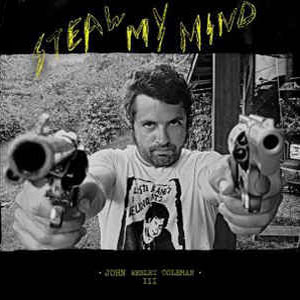
But this last year, a lot of these friends are moving out to the small towns outside of Austin. Just because the rents are going up. Every two or three years I pay more and more rent. For example, five years ago I was paying 700 bucks – now I’m paying almost 1,500. I don’t have a tech job, so it’s hard. I get different kinds of landscaping jobs and earn a little bit on music and a little bit on art.
PD: How is your new album, tentatively titled Kiss Apocalypse, getting along?
JWC: It’s either Kiss Apocalypse or Strange Birds. That’s a long story. The members of White Denim – a pretty big band – have been fans of my music for a long time and they wanted to help me out with my new record. A year and a half ago, the bass player, Steve Terebecki, said that we start recording it, so don’t do anything else. Steve Turbo is a long time good friend of mine and we’ve been in the same movie Gretchen.
But at the same time, I have a record that I made in Memphis by Andrew McCalla with Jack Oblivian and friends that is almost done. But I couldn’t finish it because I had to concentrate on the record with White Denim. And I also have all these other recordings that I’m sitting on and trying to figure out what to do with.
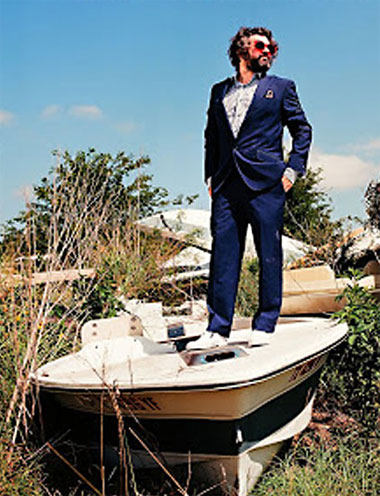
The situation is rather complicated with all these small labels I’m having contact with. By the way, it reminds me of when I played at this little record store here last October and this guy showed up with a strong German accent. “I’m a big fan”, he said and left his card. And the card said “Rough Trade Records”, the German division. That could be an opening in Europe for me so I sent him a message, but he never came back to me.
Unexpected shit happens to me all the time. But so far and in general, I’ve been very lucky.
PD: Do you have other things brewing at the moment?
JWC: I would like to record a country record. I’m thinking about that. I’m writing and want to do some serious stuff; screen plays or a book on how it was to grow up in the suburbia of Dallas before I forget about it. I’ve also been recording a little bit with some other people. And I run a little art gallery here with my partner Julia Hart, but I haven’t been able to open it since the covid. We’re just paying the rent for a place that we can’t use. I go there and put my art up. Looking at it all by myself. Ha ha. I’m a little art junkie. I read about art all the time and would like to make short documentaries of painters that I find interesting.
What I really want to do right now is come out to play with a band before an audience. But I have to wait until this covid has cooled down.
As customary, PopDiggers ask its interviewees about their current listening preferences – not just in order to get a fuller picture of the artist in question, but also to forward listening tips to all PopDiggers out there. John Wesley Coleman brought forward these albums – which are represented by one song each. Enjoy!
The Beach Boys: Sunflower (Slip On Through, 1970)
Brother JT: Tornado Juice (T.M.I, 2018)
Iggy Pop & James Williamson: Kill City (I Got Nothin’, 1977)
Royal Trux: Cats And Dogs (The Flag, 1993)
Lucinda Williams: Car Wheels On A Gravel Road (Right In Time, 1998)
Crack Pipes: Fake Eyelashes (Fake Eyelashes, 2018)
Strange Boys: And Girls Club (Woe Is You And Me, 2009)
Aquarian Blood: A Love That Leads To War [There’s A World, 2019)
Townes Van Zandt: Townes Van Zandt (Waiting Around To Die, 1969)
Thanks to John Wesley Coleman for taking the time to talk with me, for reviewing a draft of this article, and for permission to publish the excerpt from Jim Now.
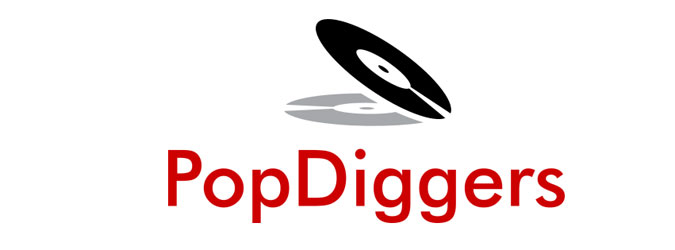


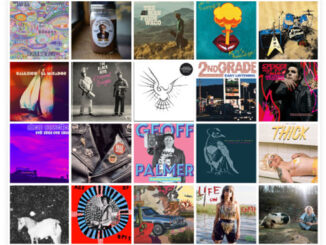
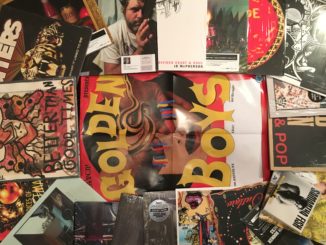
Be the first to comment